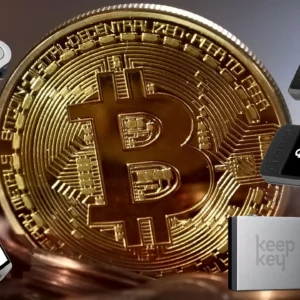Introduction
The financial world is abuzz with the emergence of spot Bitcoin ETFs, driven largely by BlackRock’s entry into this transformative space. Bitcoin, the flagship cryptocurrency, has long been viewed as both a volatile asset and a symbol of financial freedom. However, its acceptance in traditional finance has faced hurdles.
This blog will explore the significance of spot Bitcoin ETFs, the role of BlackRock, and how this development could stabilize Bitcoin’s presence in global financial markets. Let’s dive into why this move is not just a milestone for Bitcoin but also a potential turning point for institutional trust in cryptocurrencies.

Spot Bitcoin ETFs
Bitcoin ETFs have long been a topic of interest within financial circles. Unlike futures-based Bitcoin ETFs, which track Bitcoin price indirectly through contracts, a spot Bitcoin ETF directly holds Bitcoin as an asset. This distinction allows investors to gain exposure to Bitcoin without the complexities of owning and securing the cryptocurrency themselves.
The appeal of a spot Bitcoin ETF lies in its potential to bridge the gap between cryptocurrency enthusiasts and traditional investors. By packaging Bitcoin into a familiar financial instrument, investors can access it within the comfort of regulated stock exchanges, mitigating some of the risks associated with holding Bitcoin directly.
Enter BlackRock, the world’s largest asset manager with over $50 billion in assets under its iShares division alone. The firm’s application for a spot Bitcoin ETF has brought credibility to a concept previously met with skepticism. With BlackRock stepping in, Bitcoin is being validated as more than a speculative tool; it is becoming a mainstream financial asset, even amid ongoing market uncertainty.
The Role of BlackRock in Validating Bitcoin
BlackRock’s reputation for market leadership cannot be overstated. Known for its robust risk management and strategic investment decisions, BlackRock’s involvement in the spot Bitcoin ETF space is a game-changer. With $50 billion in assets already tied to ETFs, the firm’s move signals confidence in Bitcoin’s long-term viability.
This validation comes at a critical time for Bitcoin. The cryptocurrency market has faced regulatory crackdowns, price volatility, and skepticism from traditional investors. BlackRock’s decision to pursue a spot Bitcoin ETF suggests a belief in Bitcoin’s value as an asset, even amid market uncertainty.
Moreover, BlackRock’s entry could encourage regulatory bodies like the U.S. Securities and Exchange Commission (SEC) to approve spot Bitcoin ETFs. Historically, the SEC has been cautious, citing concerns over market manipulation and investor protection. However, BlackRock’s track record of compliance and transparency may alleviate these concerns, paving the way for broader acceptance of Bitcoin in regulated markets.
The implications of this shift extend beyond Bitcoin itself. BlackRock’s move demonstrates how traditional financial institutions are beginning to view cryptocurrencies as legitimate components of diversified portfolios. By entering the market, BlackRock is not just validating Bitcoin—it is also setting a precedent for other institutional players to follow suit.
Impact on the Cryptocurrency Market
The introduction of a spot Bitcoin ETF by BlackRock would have profound implications for the broader cryptocurrency market. First, it could attract a wave of institutional capital into Bitcoin, providing a layer of stability and reducing the asset’s notorious volatility.
Institutional investors often prioritize regulatory compliance and risk mitigation. A spot Bitcoin ETF managed by a trusted name like BlackRock would offer these assurances, making Bitcoin more appealing to pension funds, endowments, and other large-scale investors. The influx of institutional capital could, in turn, bolster Bitcoin’s price and solidify its position as “digital gold.”
Second, BlackRock’s involvement could drive innovation within the cryptocurrency space. Other asset managers may rush to create competing spot Bitcoin ETFs, leading to increased competition and enhanced product offerings for investors. This dynamic could accelerate the adoption of blockchain technology across various sectors, further legitimizing the cryptocurrency industry as a whole.
Finally, a spot Bitcoin ETF could benefit retail investors by increasing accessibility and reducing the complexity of investing in Bitcoin. With BlackRock’s expertise in managing ETFs, investors could trust that their exposure to Bitcoin is backed by sound financial principles, even amid market uncertainty.
Regulatory Challenges and Market Uncertainty
Despite the excitement surrounding BlackRock’s spot Bitcoin ETF application, regulatory hurdles remain. The SEC has historically rejected numerous spot Bitcoin ETF proposals, citing concerns about market manipulation and insufficient surveillance measures. While BlackRock’s reputation might sway regulators, approval is not guaranteed.
Market uncertainty also plays a significant role. Bitcoin’s price is notoriously volatile, and while a spot ETF could stabilize the market to some extent, it cannot eliminate inherent risks. Investors must weigh the potential for high returns against the possibility of significant losses, particularly in a market still finding its footing in mainstream finance.
However, BlackRock’s involvement could serve as a stabilizing force. The firm’s commitment to transparency, combined with its history of successful ETF management, might address regulators’ concerns and build investor confidence. If approved, a spot Bitcoin ETF could act as a catalyst for broader regulatory clarity, benefiting not only Bitcoin but the entire cryptocurrency ecosystem.
In the meantime, market participants are closely watching how BlackRock navigates these challenges. The firm’s ability to overcome regulatory obstacles and manage market uncertainty will determine the success of its spot Bitcoin ETF and its impact on Bitcoin’s journey toward mainstream acceptance.
Broader Implications for Bitcoin and Global Markets
The potential approval of BlackRock’s spot Bitcoin ETF marks a turning point in the integration of cryptocurrencies into traditional finance. By validating Bitcoin as a legitimate asset, BlackRock could transform how global markets perceive and interact with digital currencies.
For institutional investors, a spot Bitcoin ETF offers an entry point into the cryptocurrency market without the complexities of managing wallets, private keys, or secure storage. This convenience could lead to a surge in Bitcoin adoption among institutional players, enhancing liquidity and reducing price manipulation.
For retail investors, the implications are equally significant. A spot Bitcoin ETF managed by BlackRock would provide a trusted, regulated pathway to invest in Bitcoin, making the cryptocurrency more accessible to everyday investors. This increased accessibility could democratize Bitcoin ownership, fostering a new wave of adoption and innovation in the cryptocurrency space.
Moreover, the ripple effects could extend beyond Bitcoin. If BlackRock’s ETF proves successful, it may inspire similar products for other cryptocurrencies, further integrating digital assets into global financial markets. This shift could redefine the relationship between traditional finance and blockchain technology, bridging the gap between these two worlds in a way that benefits both.
Conclusion: The Path Forward for Spot Bitcoin ETFs
The intersection of BlackRock, spot Bitcoin ETFs, and $50 billion in assets represents a pivotal moment for Bitcoin and the broader cryptocurrency market. By pursuing a spot Bitcoin ETF, BlackRock is not only validating Bitcoin but also challenging the traditional financial world to embrace digital assets amid market uncertainty.
The road ahead is not without challenges. Regulatory approval remains a significant hurdle, and market volatility continues to test investor confidence. However, BlackRock’s entry into the space signals a vote of confidence in Bitcoin’s potential as a mainstream financial asset.
As the world watches the developments surrounding spot Bitcoin ETFs, one thing is clear: the future of Bitcoin is being shaped by the convergence of innovation, regulation, and institutional trust. Whether you are a seasoned investor or new to the cryptocurrency market, now is the time to pay attention to this evolving landscape.
What are your thoughts on BlackRock’s spot Bitcoin ETF application? Do you believe it will validate Bitcoin and stabilize the market, or do the risks outweigh the potential benefits? Share your insights and join the conversation in the comments below!






